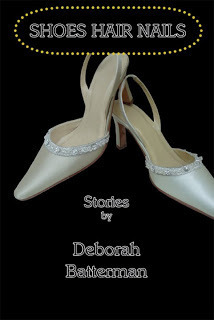Cheryl Snell's Blog, page 41
March 7, 2011
Poetic Novels: oxymoronic?
When a writer I know proudly called her prose "poetic," she meant to highlight its lush language. She was crestfallen when readers found it weedy, overgrown, and humid. Decked-out, souped-up language that calls attention to itself isn't poetic in the best sense.There are subtler elements to consider when writing a long piece. Sonics, for instance, count heavily in an art form meant to be heard. Rhythm, cadence, and phrasing, are all musical elements that drive a story and make a reader want to turn the pages.
The opening sentence from my novel Shiva's Arms, When the Sambashivans ordered the unsuitable bride and family black sheep back to India, the couple had to obey, tumbling from their brass bed on the appointed morning to dress in love beads, batik, and peace- sign jewelry, uses the "s" sounds in the family name (its sibilance is more effective than a hard-edged, abrupt or guttural-sounding name would have been) to sing to the "s" in "unsuitable". Giving way to a string of "b" sounds (bride, brass bed, beads, batik), the sentence underscores sensory details that call to the reader and invite her in.
When I render a "rapid blooming of a state of existential dread"(a wonderful phrase from M.Biberman's review of the novel) with a series of flattened "a" sounds stress the important words (last,dragged, backward) in a climactic passage like this one: it would be the last sound she ever heard on earth. She felt herself being dragged backward, I want the reader to experience the action through sound. Piling up short sentences, clauses, or even fragments with punctuation that evokes panic can leave a reader gasping for breath.
On the other hand, alternating long sentences with short ones can create a wave-like relaxation in the reader's mind. This passage takes place at the seaside, and the rhythm of long-short-long-short connects to both meaning and mood: A trick of the wind hurried her supplications on to the shore as the water slapped sand. The air clacked with finger cymbals. Nela waded out waist-deep into the river, the murti in her elbow's crook while a flotilla of figurines streamed by, streaked features half- erased, trunks of clay dissolving. She released her icon like a bad debt; like a broken promise.
The takeaway: if the sound of your prose connects to its meaning, you will have a richer piece of work.
The opening sentence from my novel Shiva's Arms, When the Sambashivans ordered the unsuitable bride and family black sheep back to India, the couple had to obey, tumbling from their brass bed on the appointed morning to dress in love beads, batik, and peace- sign jewelry, uses the "s" sounds in the family name (its sibilance is more effective than a hard-edged, abrupt or guttural-sounding name would have been) to sing to the "s" in "unsuitable". Giving way to a string of "b" sounds (bride, brass bed, beads, batik), the sentence underscores sensory details that call to the reader and invite her in.
When I render a "rapid blooming of a state of existential dread"(a wonderful phrase from M.Biberman's review of the novel) with a series of flattened "a" sounds stress the important words (last,dragged, backward) in a climactic passage like this one: it would be the last sound she ever heard on earth. She felt herself being dragged backward, I want the reader to experience the action through sound. Piling up short sentences, clauses, or even fragments with punctuation that evokes panic can leave a reader gasping for breath.
On the other hand, alternating long sentences with short ones can create a wave-like relaxation in the reader's mind. This passage takes place at the seaside, and the rhythm of long-short-long-short connects to both meaning and mood: A trick of the wind hurried her supplications on to the shore as the water slapped sand. The air clacked with finger cymbals. Nela waded out waist-deep into the river, the murti in her elbow's crook while a flotilla of figurines streamed by, streaked features half- erased, trunks of clay dissolving. She released her icon like a bad debt; like a broken promise.
The takeaway: if the sound of your prose connects to its meaning, you will have a richer piece of work.
Published on March 07, 2011 06:11
March 6, 2011
March 4, 2011
Mandolin U. Srinivas - Maximum India
Maximum India, at the Kennedy Center right now!
Published on March 04, 2011 16:31
March 2, 2011
Shoes Hair Nails

A mother as Minnie Mouse, a haircut as barometer of change; the origin of red Chinese slippers, a friend who announces "Every man is a shoe fetishist." Image functions as symbol in Deborah Batterman's first book of beautifully balanced, psychologically complex stories. Written mostly from the POV of middle-class American women, the characters pull us into their struggles with love and family. "When one Southern character speaks…an echo of all southern life can be heard," as Flannery O'Connor once said.
Batterman is adept at scenes that reverberate with implication: the negotiations of marriage, battles with the past, discoveries and disillusionments of childhood. In "Shoes," the opening story, an adult daughter tries to connect with her ailing mother, the recipient of the aforementioned red slippers.
"Did you ever really love someone?" I ask my mother...
"There are things you never tell you children," she answers, without a smile.
With well-developed metaphoric intuition, the author uses details that reflect character, and symbols her characters can react to. When a widow chooses a new hair color ("Something auburn and sensual. Like an early autumn day…") we think of the clear weather on 9/11 ("Twin Tales"). In "The Visit," a double-sided mirror divides a mother from her twins. Many of the stories' endings convey fluidity of time as well as the clinching detail.
"It's not easy, for a short story, to contain time and to display its abyss," John Updike says. Some stories, like "Hair," cover many years; the repetition of images helps achieve that span and allows the past to perfume the present. A girl cuts her hair Twiggy-style and promptly receives a postcard from her runaway mother. As an adult, the girl says, "I grew my hair long for Steven, an ad man with a fetish for short-shorts and high heel shoes and watching me eat popcorn. '— you're the only person I know who eats it one piece at a time. Where did you learn that kind of patience?' 'From my mother,' I said. He assumed I meant Jeanie, took it for granted that being a hairdresser required patience. I didn't bother to explain that the patience I was talking about came from hours and weeks and months and years of waiting. For just a word."
Batterman writes with a poet's attention to sound and rhythm. In addition, the use of lyrics in some of the stories provides a time frame and suggests the speaker's emotional state. When Norman, suffering from dementia, is cheated of his jackpot in "Vegas," a series of staccato phrases underscores his reaction. The passage recalls Eliot's theory of auditory imagination: "Kevin says nothing as the guards escort Jay away. Feels a wrenching, like a knife in his gut, as his father drops to his knees, melts into the carpet. He lifts Norman, leads him out of the casino. 'Look Mama,' says Lucy as we approach Emerald City. She points to the ceiling, to the image of a witch on a broomstick. The image, laser-produced, dissolves into two words: Surrender Dorothy."
There is a critical moment in a story when action, theme and characterization come together, the moment of change, for better or worse. Disaster erupts while the characters are distracted: spilled coffee causes a car accident which leads to a day in traffic school that ends with a woman taken hostage. A woman hated for her eccentricity pays an even steeper price when she shows a child another way to see the universe: "My eyelids fluttered. I wanted to open them but was afraid. Would I find myself in a trance? What would I do? Finally I blinked, opened my eyes, looked around the room. Above me, rotating around the bed, was a mobile resembling the solar system. Beyond that, on the midnight blue ceiling, was a galaxy of glitter." ("Crazy Charlotte")
About the quality of resonance, Virginia Woolf said, "I hope to have kept the sound of the sea and the birds, dawn and garden subconsciously present…The sea is to be heard all through it." That notion is embodied by these eleven stories, where images build throughout the narrative like music. With fresh language, captivating characters, wry humor and empathy for human experience, Deborah Batterman offers searching analyses of how people cope. She illuminates, in Shoes Hair Nails, the many ways in which we try to come together. (first appeared in Alsop Review)
The book is available in paperback and Kindle editions.
Visit the author's website for more.
Published on March 02, 2011 09:25
February 28, 2011
Shivratri

This week Hindus will observe Shivaratri.Devotees dedicate one entire night to the worship of Lord Shiva, who appeared as a pillar of fire without beginning or end, to give form to the formless.
On Shivratri, Lord Shiva's throat turned blue with poison from the churning milky ocean. Even one drop in his stomach(the universe) would have annihilated the entire world, so he held it in his neck. The 14th sloka of Shivmahimna Stotra says: "O three-eyed Lord, when the poison came up through the churning of the ocean by the gods and demons, they were all aghast with fear as if the untimely end of all creation was imminent. In your kindness, you drank all the poison that still makes your throat blue. O Lord, even this blue mark does but increase your glory. What is apparently a blemish becomes an ornament in one intent on ridding the world of fear."
There are many other legends associated with Shivratri. One of my favorites describes the union of Shiva and Parvati (the reincarnation or an avatar of Shiva's first wife), celebrated in the picture above.
Published on February 28, 2011 05:06
February 24, 2011
Memento Mori
Published on February 24, 2011 17:55
Memento Mori updated
Published on February 24, 2011 17:55
February 21, 2011
February 19, 2011
February 18, 2011
Welcome, She Writers!

Welcome, ladies, to this stop on the SheWrites.com Blogging about Books and Writing Group Ball. I have the Mysore coffee ready and a nice plate of samosas for you. This blog hop reminds me of the Indian festival of friendship called Golu -- but instead of the traditional display of dolls, I can offer you a sampling of my writing,podcasts and videos. And another samosa, of course!
Published on February 18, 2011 19:07



